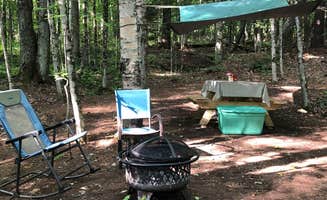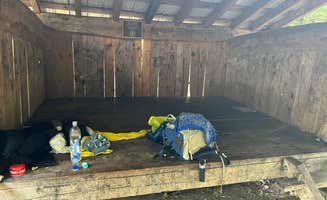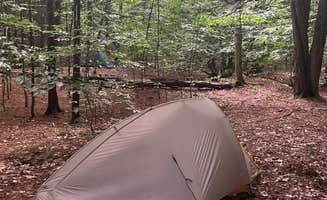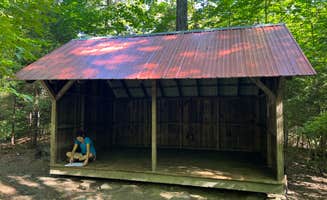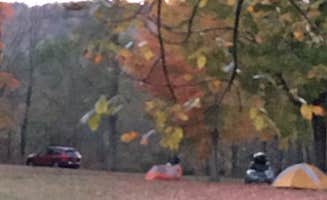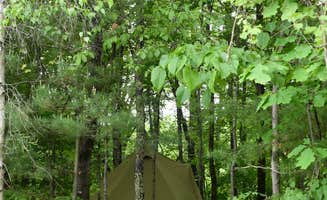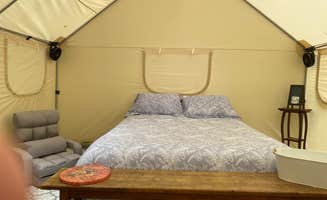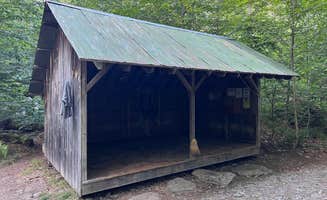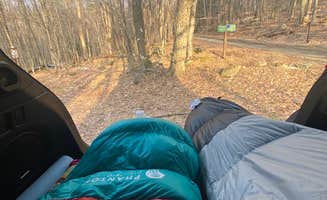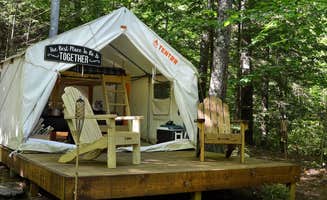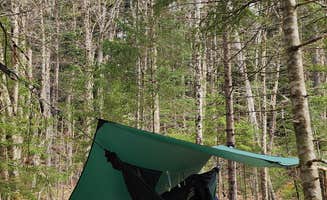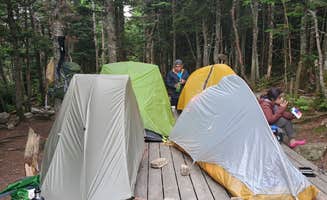The Appalachian Trail provides the primary framework for tent camping near Enfield, New Hampshire, with numerous primitive sites situated along the corridor. This section of the trail traverses forest terrain at elevations ranging from 700 to 2,300 feet, experiencing temperature variations that can drop 15-20 degrees cooler than surrounding lowlands. Several backcountry sites require permits from the Appalachian Trail Conservancy during peak hiking months between May and October.
What to do
Climb Mount Cardigan: Located near the Cardigan Campsites, this moderate hike offers rewarding summit views. "Great spot to spend the night before a climb of Mt. Cardigan! Or after! The climb is challenging but shouldn't take too long. Great fire tower views at the top too!" says Madison G. from Cardigan Campsites.
Fish the Baker River: The Baker River provides fishing opportunities for tent campers staying at nearby sites. "I tent camped here while doing some fishing in the area... I only caught a few minnows when fishing but that may have been more to do with the angler," notes Justin P. from Baker Rocks.
Explore Holt's Ledge: For those camping at backcountry sites, Holt's Ledge offers scenic viewpoints accessible via short side trails. "There was no view or other point of interest here, though a bit further up the trail there were good views at Holt's Ledge," mentions a camper about nearby tent sites.
Rock Climbing at Rumney: The Rumney Rocks climbing area attracts climbers to the region. "I started climbing at Rumney about a decade before this campground was developed, and man, were we overdue for one! Maintained by the American Alpine Club, pretty much all the campers here are rock climbers," notes Les R.
What campers like
Shelter Loft Spaces: Some AT shelters offer elevated sleeping areas providing additional options. "The shelter had a ground floor and a loft but each floor could maybe fit 4-5 people comfortably... The loft was nice since folks could decide to sleep up there while others were down below, either cooking, arriving, or departing," reports Justin P. from Happy Hill Backcountry Shelter.
Private Tent Platforms: Certain campgrounds offer elevated tent sites with added amenities. "The site had a large tent platform they could fit multiple tents, a brand new picnic table, a fire ring (with a free bundle of firewood), two chairs by the fire ring, and even a few strings of solar lights around the camp area," describes a camper.
Streamside Amenities: Some camping areas feature riverside relaxation spots. "Along another bend of the river were two chairs for taking in the scenery," notes a visitor about the tent camping areas.
Wildlife Viewing: Several campgrounds maintain small animal exhibits or have natural wildlife habitats. "They even have animals to visit like bunnies and goats (far away from the campsites)," mentions April W.
What you should know
Water Availability Varies: Water sources depend on seasonal rainfall patterns, requiring planning. "There is a water source in the area but it did not have water when I visited (probably on account of the drought)," cautions Justin P. from Trapper John Backcountry Campground.
Insects Can Be Persistent: Mosquitoes are common in these wooded camping areas, particularly during summer months. "Do bring bug spray, the mosquitoes at certain times of day were aggressive, as to be expected," advises one camper.
Tent Site Limitations: Not all backcountry shelters provide ideal tent placement options. "I got to the shelter late in the day so my view on the tent camping might be biased, but it seemed to have smaller spots for tent camping that were somewhat sloped," notes a hiker at a backcountry shelter.
Road Noise Possible: Some camping areas, particularly those closer to roads, experience traffic sounds. "There was a bit of road noise overnight," mentions a tent camper at one of the established campgrounds.
Tips for camping with families
Choose Established Campgrounds: For families, developed sites offer better facilities than backcountry options. "Our family of 4 visited Baker Rocks during a very rainy week and still had an amazing time. The campsites are private and spacious, the property is large and beautiful, close to the river," recommends April W. from Winturri Backcountry Shelter.
Consider Glamping Options: Some locations offer ready-made accommodations suitable for families. "We stayed 2 nights in the double bell tent with two clean full size beds and a 3rd night in the yurt both were spacious and wonderful, among tall trees and pines," shares a family camper.
Check Bathroom Access: Facilities vary widely from flush toilets to primitive privies. "The facilities here were great. There is a full bathhouse with individual rooms for showers and sink/toilets, with running water," notes a visitor about an established campground.
Plan For Weather Flexibility: The region experiences significant weather variations even in summer. "Our family of 4 visited Baker Rocks during a very rainy week and still had an amazing time," mentions one camper who found enjoyment despite conditions.
Tips from RVers
Limited RV Camping Options: Most sites near Enfield focus on tent camping with minimal RV facilities. "I tent camped here during a section hike of the AT. The shelter was a one-story standard AT shelter with a fire ring and a bench for seating," notes Justin P. from Thistle Hill Backcountry Shelter, illustrating the primitive nature of most sites.
Staff Responsiveness: Camp hosts can provide valuable assistance for newcomers to the area. "Staff is very friendly," mentions Brian P. about his camping experience.
Check Site Access: Many areas require significant walking or hiking to reach camping areas. "Check-in was super easy with the camp hosts who were very flexible with timing and wanted to make sure I had a great stay," reports a camper at one of the few accessible campgrounds.


